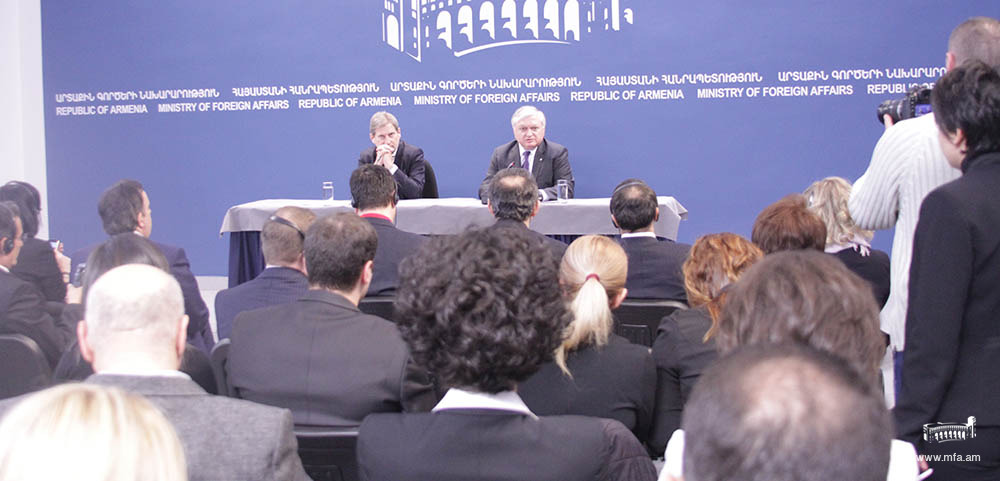The Address and Answers of Edward Nalbandian to the Questions at the Joint Press Conference with the EU Commissioner Hahn
18 March, 2015Dear friends,
I am glad to welcome Commissioner Hahn in Armenia.
We had a good opportunity today to continue our conversation that began in January, 2015, during Armenia-European Union Cooperation Council session.
Today we continued those discussions. We mentioned with satisfaction that the consultations, held between Armenia and the European Union, will outline the legal basis, that in turn will be formed as a result of negotiations. Negotiations will resume, as soon as the European Union gives appropriate mandate to its team to negotiate. I think that there are prerequisites for the mandate to be given soon. In the results of negotiations we would draft the document – the new legal basis for Armenia-European Union relations. The above-mentioned was enshrined in the Joint Statement of Armenia-EU at Vilnius Summit, by which both sides took commitments to continue cooperation in all possible areas, directions and frameworks, taking into consideration the obligations Armenia has in other integration processes and frameworks.
We believe that we have reached considerable achievements over the recent years, namely the two very important Agreements that were signed with the EU on Visa Facilitation and Readmission that entered into force in January, 2014. Also an Agreement that gives an opportunity to Armenia to participate in a wide range of EU projects and cooperate with the EU agencies was signed.
We hope that in the near future we will also start the second phase of the negotiations that will lead to liberalization of visa regime.
Mr. Hahn pays a rather short visit to Armenia. He used this opportunity as well to deliver an address at the Euronest session. I hope, that Mr. Hahn will again have a chance to pay a visit, much longer one, Armenia soon. He received such an invitation.
We will have an opportunity to continue negotiations also in Brussels and within international multilateral meetings.
I welcome you, Mr. Hahn.
The floor is yours.
Questions and answers
Question: (Aysor, ATV channel) Mr. Nalbandian, Foreign Minister of Turkey stated that Armenia does nothing to settle the Nagorno-Karabakh issue. Cavusoglu also mentioned that Armenia does not have complicated relations with all its neighbours and gave an advice to us to change our foreign policy direction, establishing relations with neighbouring states and undertaking steps towards the settlement of the Nagorno-Karabakh conflict. Your interpretation, please.
Edward Nalbandian: I would like to clarify one thing. Did you say that Foreign Minister of Turkey said that we have or have not problems?
Question: (Aysor, ATV channel) He said that we have problems with all the neighbours and advised to change our foreign policy.
Edward Nalbandian: You know, that reminds me of parable by Jean de La Fontaine. Someone looks in the mirror and says, "If I looked a bit more alike the one, I see in the mirror, I would die from boredom."
If it is about having problems with neighbours, let alone with all neighbours, then both inside and outside of Turkey the impression would be that it is just about that country. It is well known that about "zero neighbours without problems" is voiced not only outside, but inside Turkey, which is the result of the latter's so called "strategic depth" foreign policy. I believe, that before being presumptuous and ambitious to advice and teach lessons, one should consider that it has their needs.
Regarding the question on Nagorno-Karabakh, it is apparent that Turkey has always created problems for the conflict settlement. On the one hand, unequivocally protecting, contributing to the destructive stance of Azerbaijan, on the other hand, attempting to sneak in, interfere in the efforts of the Minsk Group Co-Chairs which has the international mandate. Thus, I will reiterate what was mentioned not only by us, i.e. if Turkey really wants to contribute to the settlement of the conflict, then Turkey should stay as far away from the process as it is possible.
Question: Mediamax. I have a question for Foreign Minister of Armenia. Mister Nalbandian, the rapporteur of PACE Political Affairs Committee Robert Walter visited Azerbaijan to prepare a report on the Nagorno-Karabakh issue. How would you interpret that? Thank you.
Edward Nalbandian: Our approach is well known, and I will repeat it once again, that one should refrain from steps that could cause damage to the efforts of the Co-Chairs aimed at the conflict settlement. One should refrain from creation of parallel structures, frameworks or working groups, whose activity may damage the Minsk Group efforts. One should refrain from those steps that could somehow damage the peaceful negotiated settlement. The Co-Chairs have the same stance, which they have stated on numerous occasions.
Particularly, it refers to such kind of rapporteurs, to who one of the sides, in this case Azerbaijan on top level, expresses endless gratitude to that rapporteur for the continuous support to the Azerbaijan position. This begets a question on the approaches being biased or unbiased.
I do not think that that such kind of steps could be useful. One should be very careful not to damage this delicate process, as the Co-Chairs spare no effort to get an exclusively peaceful settlement to the conflict.


